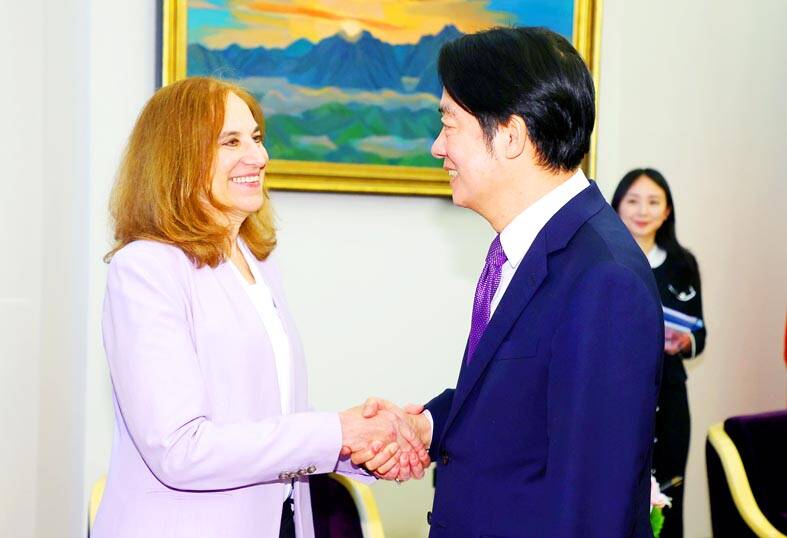Maintaining the “status quo” in the Taiwan Strait, and peace and stability in the Indo-Pacific region must be a top priority, president-elect William Lai (賴清德) said yesterday after meeting with a delegation of US academics.
Leaders of the G7, US President Joe Biden and other international heads of state have voiced concerns about the situation in the Strait, as stability in the region is necessary for a safe, peaceful and prosperous world, Lai said.
The vice president, who is to be inaugurated in May, welcomed the delegation and thanked them for their support for Taiwan and issues concerning the Strait.

Photo: CNA
The international community closely observed the Jan. 13 presidential and legislative elections in Taiwan, waiting to see how Taiwanese would cast their ballots when faced with China’s military threats and propaganda, he added.
Taiwanese voted for the country to work more closely with other democratic countries, he said.
Situated in the first island chain, Taiwan is directly threatened by China, “but we know our responsibility, and we will do our best to maintain peace and stability in the Indo-Pacific region,” he said.
Taiwan hopes the international community would continue to show concern over the situation in the Strait, as maintaining regional peace and stability can only be achieved by working together with the global community, he added.
While continuing to be a crucial part of the international supply chain, Taiwan hopes to obtain more significant support from the US government and the international community for the nation’s inclusion in regional economic organizations, Lai said.
Instability in China’s economy and government, as well as a more hostile environment across the Strait, have led to many Taiwanese businesses pulling out of China and investing in the US, Japan, the EU and other parts of the Indo-Pacific region, he said.
If Taiwan can work with other countries in a regional framework, it would bolster the nation’s industrial development, he added.
Members of the delegation included German Marshall Fund Indo-Pacific Program managing director Bonnie Glaser, Eurasia Group China practice managing director Rick Waters, American Enterprise Institute senior fellow Zack Cooper and Freeman chair in China Studies at the US Center for Strategic and International Studies Jude Blanchette.

Auckland rang in 2026 with a downtown fireworks display launched from New Zealand’s tallest structure, Sky Tower, making it the first major city to greet the new year at a celebration dampened by rain, while crowds in Taipei braved the elements to watch Taipei 101’s display. South Pacific countries are the first to bid farewell to 2025. Clocks struck midnight in Auckland, with a population of 1.7 million, 18 hours before the famous ball was to drop in New York’s Times Square. The five-minute display involved 3,500 fireworks launched from the 240m Sky Tower. Smaller community events were canceled across New Zealand’s

The Ministry of Foreign Affairs (MOFA) yesterday said it is closely monitoring developments in Venezuela, and would continue to cooperate with democratic allies and work together for regional and global security, stability, and prosperity. The remarks came after the US on Saturday launched a series of airstrikes in Venezuela and kidnapped Venezuelan President Nicolas Maduro, who was later flown to New York along with his wife. The pair face US charges related to drug trafficking and alleged cooperation with gangs designated as terrorist organizations. Maduro has denied the allegations. The ministry said that it is closely monitoring the political and economic situation

‘SLICING METHOD’: In the event of a blockade, the China Coast Guard would intercept Taiwanese ships while its navy would seek to deter foreign intervention China’s military drills around Taiwan this week signaled potential strategies to cut the nation off from energy supplies and foreign military assistance, a US think tank report said. The Chinese People’s Liberation Army (PLA) conducted what it called “Justice Mission 2025” exercises from Monday to Tuesday in five maritime zones and airspace around Taiwan, calling them a warning to “Taiwanese independence” forces. In a report released on Wednesday, the Institute for the Study of War said the exercises effectively simulated blocking shipping routes to major port cities, including Kaohsiung, Keelung and Hualien. Taiwan would be highly vulnerable under such a blockade, because it

UNRELENTING: China attempted cyberattacks on Taiwan’s critical infrastructure 2.63 million times per day last year, up from 1.23 million in 2023, the NSB said China’s cyberarmy has long engaged in cyberattacks against Taiwan’s critical infrastructure, employing diverse and evolving tactics, the National Security Bureau (NSB) said yesterday, adding that cyberattacks on critical energy infrastructure last year increased 10-fold compared with the previous year. The NSB yesterday released a report titled Analysis on China’s Cyber Threats to Taiwan’s Critical Infrastructure in 2025, outlining the number of cyberattacks, major tactics and hacker groups. Taiwan’s national intelligence community identified a large number of cybersecurity incidents last year, the bureau said in a statement. China’s cyberarmy last year launched an average of 2.63 million intrusion attempts per day targeting Taiwan’s critical